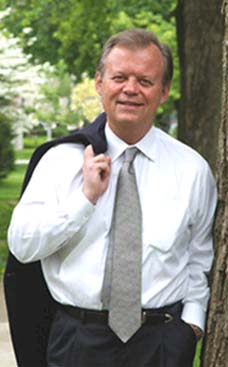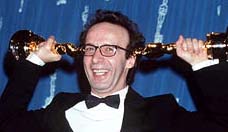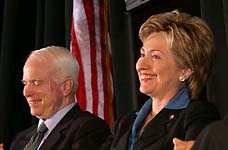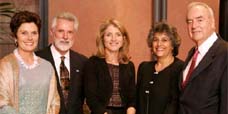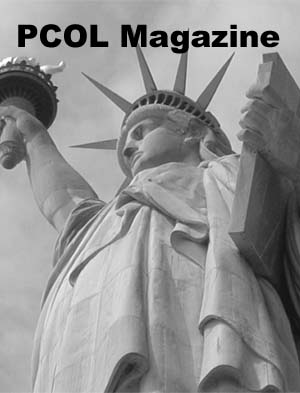
Will Fair Use Survive?: Free expression in the age of copyright control represents a year-long survey of the health of “fair use”, a provision in US law that exists to ensure First Amendment rights when handling material protected by copyright and trademark law. The prognosis delivered by the report’s authors Majorie Heins and Tricia Beckles is grim. It seems that legal haziness surrounding fair use, and an increasing will among intellectual property owners to pursue infringement-related grievances through a prohibitively expensive legal system, are combining to stifle free expression.
The attack on "Fair Use" that promotes criticism, comment, news reporting, teaching, scholarship or research
The abuse of “fair use”
Becky Hogge
18 - 1 - 2006
American free speech is being squeezed by bad case law and the disproportionate power of intellectual property owners. US citizens must be vigilant, says Becky Hogge.
------------------------------------------
While the Bush administration stands accused of complicity in torture, corrupting the political process, and spying on its own citizens, the average American may find it hard to summon up the energy to get angry about copyright law. But a report published in December by New York University’s Brennan Center for Justice should make any American possessing even a passing familiarity with the works of George Orwell choke on their coffee.
Will Fair Use Survive?: Free expression in the age of copyright control represents a year-long survey of the health of “fair use”, a provision in US law that exists to ensure First Amendment rights when handling material protected by copyright and trademark law. The prognosis delivered by the report’s authors Majorie Heins and Tricia Beckles is grim. It seems that legal haziness surrounding fair use, and an increasing will among intellectual property owners to pursue infringement-related grievances through a prohibitively expensive legal system, are combining to stifle free expression.
Fair use is what lets me discuss the Brennan Center report in the first place. By quoting its title I am technically infringing the authors’ intellectual property rights (or the Brennan Center’s, depending on the terms of Heins’ and Beckles’ employment contracts). But because I am engaged in what the 1976 Copyright Act describes as “criticism, comment, news reporting, teaching…scholarship or research”, I’m not expecting to hear from NYU’s lawyers anytime soon.
Copyright terms in the United States can extend beyond a century, thanks to the 1998 Sonny Bono Copyright Term Extension Act. Consider the sentence “I disapprove of what you say, but I will defend to the death your right to say it”. Often misattributed to Voltaire, it was written by SG Tallentyre (Evelyn Beatrice Hall) in her 1906 work The Friends of Voltaire. Thus it is most likely still protected by copyright law. Can I quote it under US law? It illustrates a key view of free expression – but I am not critiquing it here. Am I, therefore, stealing it?
As an artist, critic, activist or scholar, gaining a judgment of fair use in the US relies on four considerations:
* “purpose or character of the use” – is the new use of the “stolen” work transformative, in the artistic sense? Does it advance political debate? Was it “borrowed” for the good of society, or “stolen” to profit the “thief”?
* how special was the original work? Was it an act of pained creative gestation, or an office memo (of which more later)?
* how much of the original work was stolen?
* what effect has the copyright infringement had on the market of the original work?
So far, so good. Indeed, in a recent piece on openDemocracy, Michael Handler of the Australian National University’s law faculty, offered muted praise for US fair use, in contrast to its more restrictive cousin, fair dealing, which only allows for the borrowing of copyrighted work for specific purposes.
But with flexibility comes uncertainty. And legal uncertainty will often be exploited by the party with the most legal resources – which leads to bad case law, which leads to more legal uncertainty… The history of fair use judgments since the 1976 act is a troubled one. In 2003, on completing a survey of US fair use judgments, copyright expert David Nimmer concluded that “had Congress legislated a dartboard rather than the particular four fair use factors embodied in the Copyright Act, it appears that the upshot would be the same”.
Fair use, then, has become an unreliable tool for free-speaking Americans. This means that artists and critics are being intimidated as they go about their business of enriching society and pushing intellectual and creative boundaries through critique and appropriation of previous human endeavour.
Contrary to a stereotype popular among Europeans, most Americans would happily go through their entire lives without uttering the words “I’ll see you in court!” Pro bono lawyers are hard to find and the chance of losing a fair use case conjures the prospect of penury and occasionally jail. As a result, the Brenner Center report found, many copyright infringement claims for which a valid fair use defence might exist are never fought, and criticism of commercial, political and religious practices is silenced.
The floodgates for spurious claims of copyright infringement are propped open further by the 1998 Digital Millennium Copyright Act (DMCA), which holds internet service providers (ISPs) responsible for infringing material they host on behalf of third parties. This piece of legislation – akin to motorway owners being held liable for traffic accidents, or telephone companies for prank phonecalls – means that more often than not a disinterested party gets to choose whether to flick the censorship switch.
The US legal environment surrounding fair use has thrown up some truly Orwellian situations. In 2003, a manufacturer of electronic voting machines used in the US election, Diebold Inc, sent a DMCA takedown notice to the ISP of students at Swarthmore University. Their crime? They were circulating internal memos discussing serious defects in the company’s product, memos for which Diebold claimed to own the copyright. Confident they had a fair use case, the students stood their ground. With support from the Electronic Frontier Foundation, they sued and Diebold backed down.
But Howard Hallis was not so pushy. When his ISP let him know they’d received a DMCA takedown notice from Chick Publications, one of whose creationist cartoons he had satirised on his website, he complied almost immediately, with the rueful comment, “the piece was done in fun, but you got to realise that the laws can censor you”.
Should the American public be so complacent, the frontiers of free speech may well retreat. The Brennan Center report’s recommendations call for better education of artists and critics over their rights to use others’ speech, backed by a larger pool of pro bono lawyers ready to take on the big boys for the sake of the First Amendment. As for a change in the law? Don’t hold your breath. As Lawrence Lessig candidly observed last month: “The good stuff on 'fair use' just won’t stop coming (if only now we could get some good judicial decisions).”





